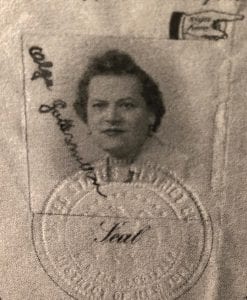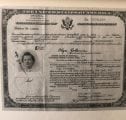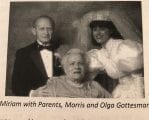- Local Survivor registry
- OLGA GOTTESMAN
- Local Survivor registry
- OLGA GOTTESMAN
Survivor Profile

OLGA
GOTTESMAN
(1916-1988)
PRE-WAR NAME:
OLGA HECHT
OLGA HECHT
PLACE OF BIRTH:
OBORIN (ABARA) CZECHOSLOVAKIA
OBORIN (ABARA) CZECHOSLOVAKIA
DATE OF BIRTH:
JUNE 6, 1916
JUNE 6, 1916
LOCATION(s) BEFORE THE WAR:
OBORIN (ABARA), CZECHOSLOVAKIA
OBORIN (ABARA), CZECHOSLOVAKIA
LOCATION(s) DURING THE WAR:
AUSCHWITZ, POLAND; NUREMBERG, GERMANY; FORCED LABOR; HOLYSOV, CZECHOSLOVAKIA, LABOR CAMP; UNGVAR GHETTO (UZHOROD, UKRAINE
AUSCHWITZ, POLAND; NUREMBERG, GERMANY; FORCED LABOR; HOLYSOV, CZECHOSLOVAKIA, LABOR CAMP; UNGVAR GHETTO (UZHOROD, UKRAINE
STATUS:
SURVIVOR
SURVIVOR
RELATED PERSON(S):
MORRIS GOTTESMAN - Spouse (Deceased),
ELLA REICH SISTER (Deceased),
ISADORE REICH BROTHER IN LAW (Deceased),
MIRIAM F. DOBIN - Daughter,
DOVID DOBIN - Grandson,
RIVKA DOBIN - Granddaughter,
ASHER DOBIN - Grandson,
YAAKOV DOBIN - Son-in-law,
JOZSEF STRAUSS (1ST HUSBAND) (Deceased)
-
biography by Miriam F. dobin, daughter
My mother, Olga Gottesman was born June 6, 1916 in Oborin, Czechoslavakia to David and Margit Hecht. David, born in 1888 and Margit (nee Princz) born in 1892 were married in 1912. They lived in Svalyava where their first-born child, Ella, Olga’s sister was born on December 20, 1913. Six weeks later they moved to the town of Abara (Hungarian for Oborin) on the border of Austria Hungary where Olga, their second child was born. The Hechts had six children which they raised in the Orthodox tradition.
Olga grew up in a middle- class observant Orthodox family. Her father was a notary and owned a general store. Her mother helped run the store. Although Olga’s brothers went to cheder, a Jewish school, they did not have enough money to send the girls. They had a teacher, melamed, who came to the house to teach the girls how to read Hebrew and prayers. Olga and her sisters helped their mother with the housework. They lived in a small house, but on a large property.
In 1940, the general store was confiscated. In 1941 Olga, more than 25 years of age, married Jozef Strauss, a man nine years older than her. A few months later, the Hungarian Nazis took Jozef away for six weeks to a ZAL or forced labor camp. He then returned home for less than a year only to be taken again. Subsequently, he died in a Russian camp as a prisoner of war in 1942. Olga tried to say goodbye but was beaten by Hungarian soldiers. This first loss was traumatic. As stated in my memoir, “my mother never experienced closure of the tragedy that befell her as a young bride.”
My mother was alone now, so she went back to live in her parent’s home. During Passover 1944, Olga and her family were put on a wagon, and sent to ghetto Ungvar for a month. In July, the family was deported to Auschwitz.
Life in Auschwitz began. Every morning there was an appel. During selection, Olga and Ella would stand in the row behind their mother and 2 sisters. Olga’s mother and two younger sisters were taken away. Olga’s older sister Ella was told to go to the “right” which meant work. Olga, her mother and two sisters were chosen for the line on the left which meant the crematoria. In all the commotion, and confusion of people running right, and left, Olga took the chance that saved her life and ran to the right. Doing this dangerous yet heroic act saved her life! This took place in September 1944 right after Yom Kippur. Olga never saw her mother or younger sisters again. Her father and two brothers were separated from the family upon arrival in Auschwitz and all perished later that year, the third day of Chanukah.
While in Auschwitz, Olga’s menses ended and did not resume after the war. There was little food, and poor conditions. My mother had a strong personality, and would talk back to the kapos (often Jewish women who were appointed by the Nazis as guards), who would beat her.
In October of 1944, Olga was transported with her sister Ella to the labor camp of Nuremberg in Germany. They worked with electric light bulbs and wiring wheels for airplanes. In Feb/March 1945, Olga and Ella were transported to another forced labor camp called Holysov in Czechoslovakia. There they worked in a munitions factory filling shells with gunpowder, and stamping them. They were liberated by the Russian Partisans on May 7,1945.
Through the sponsorship of their uncle in Newark, New Jersey, Olga and Ella and Isadore emigrated to the United States in January 1949. From liberation in 1945 until they arrived in New York Harbor, the journey took over three years. Olga met her future husband Morris, also a Holocaust survivor in the United States, and they were married in 1953. My mother had not menstruated in 20 years since the war. She went to many doctors. G-d helped her along the way. It would be eleven more years before Olga would be able to give birth to her one and only “miracle” child, Miriam, in March of 1964. At the time, Olga was 48 and Morris was 56. In 1965 Olga had a tumor removed from her brain. She continued to suffer from illness most of Miriam’s childhood, causing her to rely on Aunty Ella and Uncle Isadore as second “parents.” In 1974 when Miriam was 10, Olga suffered a debilitating stroke and spent much of her remaining 14 years in hospitals and nursing facilities.
To enable Morris to continue working, Miriam went to live permanently with Aunty Ella and Uncle Isadore who were never able to have children of their own. With the exception of Morris’s younger brother who had emigrated to Palestine in 1933, Olga, Morris, Ella, and Isadore were the only survivors of the Gottesman/Hecht families.
My mother was an exceptional individual. She knew her older sister, Ella would never be able to conceive, so she was blessed to have a child to share with her dear sister, Ella. I was very blessed to have these two mothers. Olga was blessed with a child of her own, saw Miriam get married, and was able to have much pleasure from her first grandchild until she passed in June 1988 after a long illness.
Editor’s Notes:
Refer to Voices of the Descendants for Miriam Dobin’s Registry.
Refer to the Survivor Registries of Morris Gottesman, Ella Hecht and Isadore Hecht.
Refer to Miriam Dobin’s memoir, I Am Because of You (2015) available on amazon.com or Dobin’s website at www.Iambecauseofyou.net
-
SURVIVOR INTERVIEW:
Refer to Biography above and Dobin’s memoir I am Because of You available at amazon.com.
-
Sources and Credits:
Credits:
Biography by Miriam Dobin from I Am Because of You 2015.
The SSBJCC Holocaust Memorial and Education Center gratefully acknowledges the donation by Miriam Dobin of her memoir, I am Because of You (2015) and digital historic and family photographs and documents therein. website: www.Iambecauseofyou.net. I Am Because of You at amazon.com






